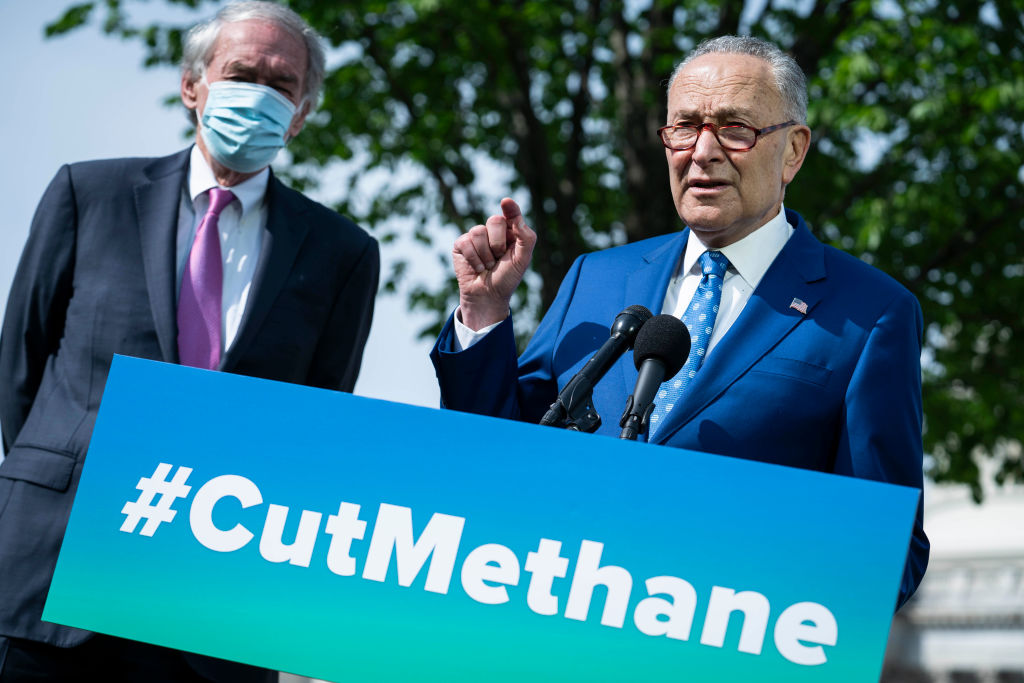With its new Inflation Reduction Act (IRA), the government is pulling one of those infomercial tricks where they throw in a third bottle of OxiClean ABSOLUTELY FREE! Acting as if the cost of everything hasn’t already been calculated and passed onto the consumer.
The IRA, you see, contains a “Methane Emissions Charge” that will impose a $900-a-ton tax on oil and gas producers that will increase to $1,500 after two years. The left is patting itself on the back for their valiant work to cut greenhouse gas emissions drastically by 2030. But here’s the thing: the energy industry is already working hard to cut emissions; it’s in their interest to do so. And when the government fines them for not capturing enough methane, guess who gets to foot the bill? Households already burdened by inflation.
“Methane that escapes during production or transportation is called fugitive or vented emissions,” Bernard L. Weinstein wrote at the Hill when the methane fee was introduced in the original Build Back Better bill last year. “These emissions have dropped remarkably sharply over the past decade. Why? Because energy companies have every incentive to capture methane, which is the principal component of natural gas. Those who put hard work and money into producing and transporting natural gas don’t want to lose any of it on the way to market.”
Long before BBB came along, market forces were at work, and methane emissions from natural gas extraction declined by 16 percent from 1990 to 2019. So in other words: the oil and gas industry is reducing methane emissions, and the Biden administration wants to take credit for it. And in the midst of an energy crisis, as suppliers scramble to meet demand, the government is adding mandates and punishments to the fraught industry, making the process of supplying energy to Americans all the more onerous.
“Why isn’t Big Oil up in arms about the climate-friendly Inflation Reduction Act?” wonders a headline at marketplace.org. The bill’s minimum tax rate isn’t a big deal to oil companies, the article says, because “a lot of the larger oil companies already pay taxes above that minimum,” and, as Weinstein noted, “they’ve been trying to limit methane leakage anyway.”
But emissions do happen, and when they do, the consumer is punished. The reason Big Oil isn’t “up in arms” about the IRA is because they know everyone in America needs energy (and all the other wonderful stuff oil makes) and that when they pass the Methane Emissions Charge onto the consumer, they will pay it because they have no other choice. In 2021, 61 percent of energy in the US was generated from fossil fuels: coal, natural gas, petroleum, and other gases, while 19 percent was from nuclear energy and just 20 percent was from renewable energy sources.
“Clean” energy is a virtuous (and lofty) goal, but billions of dollars in green energy subsidies will do nothing to help American households and businesses that are hurting now. Punishing the energy industry and passing fines onto consumers is counterproductive and won’t do anything to help the environment. What would help consumers is streamlining the permitting process, as American Petroleum Institute CEO Mike Sommers said in a statement earlier this week:
While we’re encouraged that [the IRA] will likely open the door to more federal onshore and offshore lease sales and will expand and extend tax credits for carbon capture, we remain opposed to policies that raise taxes and discourage investment in US oil and natural gas. Glaringly absent in the bill is permitting reform, which is required for America’s infrastructure needs and to bolster critical oil, natural gas and renewable supplies to meet our current and future energy demand.
Two House Democrats are wise to the IRA and its implications for their home state of Texas, where oil and gas are big. Fox News reminds us that Representatives Henry Cuellar and Vicente Gonzalez “wrote a letter to House Speaker Nancy Pelosi last year complaining the methane fee, which was included in the earlier version of the House Build Back Better legislation, ‘unfairly targets oil and gas companies’ and that it would hurt the ability for the US to be competitive in the world energy market.”
Here’s to hoping these Dems — who also voted against the so-called “assault weapons ban” — are power-hungry enough to vote in favor of American industry.


















